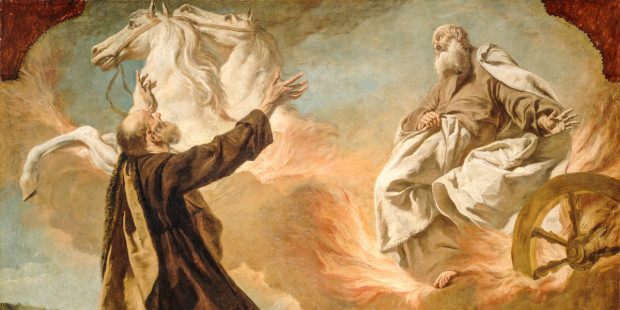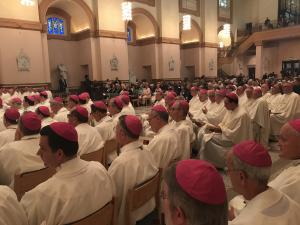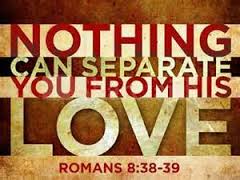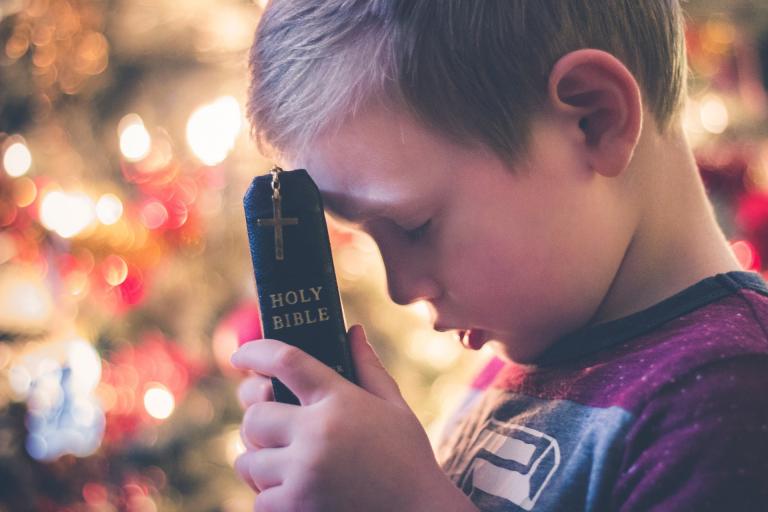I read a story of a priest who encouraged a group of men with the words, “If you ever feel inadequate as a father, just think of Saint Joseph. He was tasked with leading the Holy Family, but he was the only sinner out of all of them.”
In the drama of the incarnation, Jesus is, of course, the star. That’s the way it is at every birth. All eyes are on the child. The co-star though, is Mom. Without her love and labor, the event could not have happened. In this case, without Mom’s faith it could not have happened either. According to Luke’s Gospel, an angel brought her stunning news. She believed the unbelievable and said, “let it be”.
But there is a best supporting actor in this drama as well. True, Joseph was not the biological father. But the messiah had to be of David’s royal line. In ancient Israel, a child’s clan was determined by that of his father. So, it was Joseph who legally bound Jesus to the house of David. It was because of Joseph that the family had to go to Bethlehem for the census, that the prophecy would be fulfilled.
During my discernment for a confirmation name, I contemplated how difficult things were for Mary, but really considered the almost impossible task given to Saint Joseph. He was meant to protect the Mother of God, and then raise the Son of God. Yet Mary was conceived without sin and Jesus was fully divine. They were born equipped for a life of holiness. Joseph, on the other hand, was born with original sin like us. He lived most of his life as a regular craftsman. What could possibly qualify him for this new, challenging vocation?
Yes, we know very little of Joseph from Scripture. We know he was a just and kind man. And we know he was from Bethlehem but lived in Nazareth when he became betrothed to Mary. Tradition holds that he was already advanced in age when Jesus was born but this isn’t certain from the Gospel accounts. Tradition also says that Joseph was a carpenter, a wood worker. But the Greek word for his occupation means simply a craftsman who worked with wood, stone, or metal. However, very early Fathers of the Church such as Justin Martyr say Joseph was not only a carpenter but specifically a maker of wooden yokes and ploughs, a fitting occupation for the foster father of the man who would become the Lord of the harvest and would call men to his light yoke.
However appropriate the symbolism of Joseph’s career, I doubt this was much comfort when the angel announced God’s plan to him. “Joseph, son of David, do not be afraid to take Mary as your wife; for the Child who has been conceived in her is of the Holy Spirit. She will bear a Son; and you shall call His name Jesus, for He will save His people from their sins[1].” I know Saint Joseph was a much holier man than I am. Still, I can’t imagine not laughing at the command to not be afraid when it’s followed by an announcement that my wife-to-be is pregnant with the Son of God and Messiah. Few things would fill me with more fear. “You may be an undigested bit of beef, a blot of mustard, a crumb of cheese, a fragment of underdone potato. There's more of gravy than of grave about you, whatever you are!”
If Joseph was afraid, he clearly overcame that fear, taking on the task of father to the most important child in human history. Scripture doesn’t give us a list of St. Joseph’s fatherly qualities, but we can glimpse these in places. We know that Joseph was willing to sacrifice much for his family. His first act upon hearing the news of the Incarnation was to put aside his good name and reputation. He knew that his virtue and judgment would be questioned when others found out about Mary’s pregnancy, but he seems to have ignored that for the sake of the child. Later, Joseph put himself last again when, for the sake of his stepson, he left his business and whisked away his family to safety in Egypt.
Scripture also tells us that Jesus’ parents were faithful to their religious obligations. They took Jesus to the temple for his dedication. And they made their pilgrimage to Jerusalem for important festivals. We also know Jesus was extremely well versed in Scripture. He must have grown up in an environment of love for God’s word and dedication to Torah. From this background, the Gospel of Luke tells us, Jesus grew up “in wisdom and in stature[2]”. The “wisdom” Luke refers to is obvious in Jesus’ adult ministry. But what of the “stature”? Luke may simply mean here that Jesus, like all other children, grew taller and developed physically. But I like to imagine the child Jesus helping his father in his workshop, learning to saw and carve, developing an eye for this craft while also gaining strong arms and calloused hands. We do see a hint of this later when an unbelieving crowd ask, “Isn’t this the carpenter’s son[3]?” Apparently, Jesus’ upbringing was so normal that his ministry is quite shocking to those who knew him. Perhaps the crowds might have been less incredulous if Jesus had spent his entire adolescence in the Temple. But, it would seem he instead spent much of his time learning his earthly father’s trade.
From these glimpses in Scripture, we can see that Joseph was a loving and selfless father who was dedicated to his faith, worked hard at his craft, and taught his son these same virtues. No wonder, then, that Saint Joseph is the patron saint of fathers. Of course, there is an irony here in that Joseph was not actually the biological father of Jesus. Yet even that is a lesson this great saint can teach us. Because, even for us with biological offspring, our children are not really ours. They are children of God entrusted to our care. Therefore, we aren’t meant to merely teach our children to mimic us. We are meant to teach them to pursue their Father in Heaven. This still seems like an impossible task. Yet we can follow the example of St. Joseph. And we can ask his intercession. If Joseph could lead the Holy Family, then surely, he can help us lead our own families into holiness.
How Old was Saint Joseph when Jesus was Born?
The simple answer is that we do not have any record of St. Joseph’s age when he was betrothed to our Blessed Mother Mary and when Christ was born. Indeed, the portrayal of St. Joseph also is conflicting. For example, Guido Reni’s “St. Joseph and the Child” depicts a gray-haired elderly man holding baby Jesus, whereas Jose de Ribera’s “St. Joseph and the Boy Jesus” and Bartolome Murillo’s “The Holy Family” depict a young man with the child Jesus.
The depiction of St. Joseph as an elderly man arises from a “speculation” in the Eastern churches that he was an elderly widower who had other children before he married Mary. This speculation sought to solve two issues:
First, Mary is the ever-virgin mother of our Savior, and therefore, she and St. Joseph did not have other children. Unlike a virile young man, an old man past his prime would not be tempted to have conjugal relations with a much younger woman. Surely his libido would have quelled long ago. In this sense, an old St. Joseph is “a safe St. Joseph.”
Second, the elderly widower St. Joseph who had other children would explain the Gospel references to “the brothers and sisters of the Lord.” These brothers and sisters would then be Jesus’ half-brothers and half-sisters, but only by law, not by blood since Joseph was not the natural father of Our Lord. For example, in the Gospel of St. Mark, we read, “Isn’t this the carpenter, the son of Mary, a brother of James and Joses and Judas and Simon? Aren’t his sisters our neighbors here[4]?”.
The “elderly widower” argument is not needed if one understands the meaning of brother. In the original text of the Gospel, the Greek word “adelphos”, meaning “brother,” is used. However, adelphos does not just mean a blood brother born of the same parents but also a half-brother, a step-brother or even another male relationship, like a cousin or a nephew. Note also that in Hebrew and Aramaic, no special word existed for cousin, nephew, half-brother or step-brother; so, they used the word “brother” or a roundaboutness, such as in the case of a cousin, “the son of the brother of my father.”
The same understanding is true for the word sister. For example, in the Gospel, Mary of Clopas is called “the sister” of Mary, the Mother of Jesus. Obviously, St. Ann and St. Joachim would not have named two daughters “Mary”; instead, the “sister” used here denotes a cousin relationship.
In sum, there is no need to think that St. Joseph had to be an elderly widower to resolve the supposed brother/sister relationship question.
Also, I personally cannot imagine elderly St. Joseph walking 100 miles from Nazareth to Bethlehem to register for the census or walking from Bethlehem to Egypt to flee the wrath of King Herod. I also happily imagine St. Joseph as the young man who could provide for his family and as the good masculine example and image of human fatherhood for Jesus. Archbishop Fulton Sheen, in his book The World’s First Love, speculated: “Joseph was probably a young man, strong, virile, athletic, handsome, chaste, and disciplined, the kind of man one sees … working at a carpenter’s bench. Instead of being a man incapable of loving, he must have been on fire with love. … Young girls in those days, like Mary, took vows to love God uniquely, and so did young men, of whom Joseph was one so preeminent as to be called the ‘just.’ Instead then of being dried fruit to be served on the table of the King, he was rather a blossom filled with promise and power. He was not in the evening of life, but in its morning, bubbling over with energy, strength, and controlled passion[5]”.
Granted, while no record exists of St. Joseph’s actual age, the image of a young virile St. Joseph best captures the words of the litany in his honor: “St. Joseph – chaste guardian of the Virgin, foster father of the Son of God, diligent protector of Christ, head of the Holy Family, most just, most chaste, most prudent, most strong, most obedient, most faithful. …” In an age where fatherhood has been marginalized, masculinity undermined, and chastity scorned, may each of us honor and cherish the example of St. Joseph, trusting in his prayers to help us on the path of salvation.
It is the common opinion of the Doctors of the church that, when the Blessed Trinity gave Joseph as spouse to Mary, no other man could have been found so like to her. St. Bernardine of Siena said that there were never two spouses so like to each other as were Mary and Joseph. But that does not mean that equality existed between them. Inferior to Mary, he had none like him among men. Mary and Joseph were more like partners. Consider the discovery of Jesus in the temple: “"Son, why have you treated us this way? Behold, your father and I have been anxiously looking for you[6]." Joseph was so like her that there was no one else who could enter into comparison with him.
[1] (Matthew 1:20-21)
[2] (Luke 2:52)
[3]
[4] (Mk 6:3)
[5] (pp. 77-78)
[6] Luke 2: 48




















